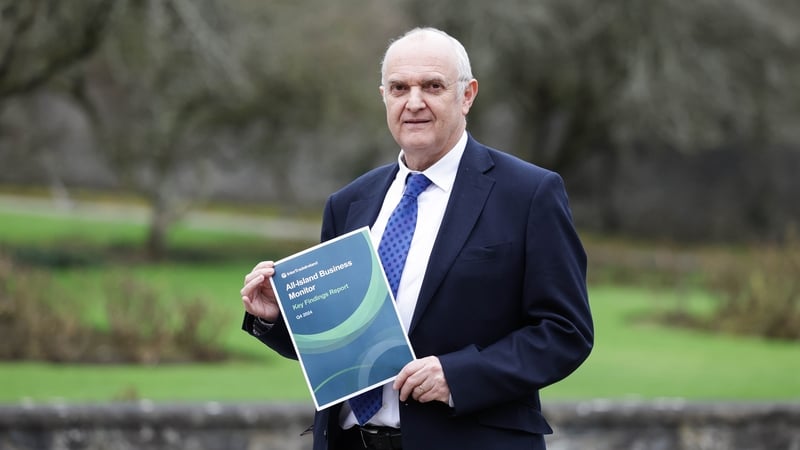InterTradeIreland has said it is difficult to speculate on what opportunities will emerge for businesses in Northern Ireland, when the US imposes tariffs on the EU and not the UK.
The all-island agency welcomed the Oval Office meeting between Taoiseach Micheál Martin and US President Donald Trump yesterday, saying it was an opportunity to deepen and strengthen the trading link with a really important trading partner.
Asked if businesses in Northern Ireland would welcome the competitvie advantage if tariffs imposed on the EU are not imposed on the UK, Martin Robinson, Director of Strategy said it is difficult to know how it is going to play out.
“We don’t have the specifics as to where the tariffs are going to apply; what particular areas and products. It’s difficult and not that helpful to speculate on what the opportunities will be,” Mr Robinson told Morning Ireland.
“I suppose from our perspective, the key message we take from our business monitor is that trade on the island remains very positive and there are significant opportunities for businesses right across the island to trade and collaborate more,” he added.
We need your consent to load this rte-player contentWe use rte-player to manage extra content that can set cookies on your device and collect data about your activity. Please review their details and accept them to load the content.Manage Preferences
Global volatility has dented the appetite for business investment according to InterTradeIreland’s business monitor which shows firms are adopting a “wait and see” approach in the midst of the current market turmoil.
The survey revealed that the majority of companies (55%) were “maintaining a stable footing”.
There were still signs of growth from 32% of businesses, with investment ambitions “muted”.
When asked about their plans for 2025, only a small percentage of firms (5%) said they are considering major investments in new markets, while nearly half (49%) are focused primarily on maintaining their current position.
Mr Robinson said, “It seems that external pressures are forcing most businesses to play it safe and adopt a ‘steady as she goes’ approach rather than plan for growth.
“Currently there are elevated external challenges with local and global trade policy uncertainty and lingering geopolitical tensions which may be curbing the appetite for investment. We see that rising overheads and energy costs remain the top internal concerns for firms on the island- each impacting more than half of businesses, driven in large part by global factors.”
He said other persistent challenges include recruitment difficulties, with 40% of those who’ve tried to recruit in the last two years struggling to find staff.
Businesses are also reporting cash flow issues (18%) and reduced demand (17%). However, while most businesses have maintained staffing levels, there is a slight uptick in hiring expectations, particularly among larger firms. InterTradeIreland said this could signal some recruitment optimism despite the difficulties.
Further bright spots across indicators of economic demand include profitability and sales expectations. Two-thirds of firms are reporting profit, while sales expectations are at their highest since pre-Covid, with 44 per cent of firms anticipating sales growth over the next 6 months.
Peter Burke, Minister for Enterprise, welcomed the findings. “I am pleased to see that profitability remains strong and that businesses are optimistic about sales. The Programme for Government is focused on supporting our enterprise base and contains a number of ambitious measures to drive economic growth and innovation”.
“In the Department of Enterprise, one of a number of steps we are taking is the launch of a new Small Business Unit, to be established in the coming weeks to ensure the delivery of targeted support for small businesses and employers. Small businesses continue to be the backbone of our local and national economy and a key component of the wider sector,” the Minister said.
For most businesses, post-Brexit trading disruptions have not made a significant impact. However, for the one in five businesses that are affected some adaptation has been necessary with 68% of these stating they have modified their supply chain, while over half (54%) have had to adjust to more paperwork.
Caoimhe Archibald MLA, Economy Minister said growing a globally competitive and sustainable economy is a priority for the Executive’s Programme for Government.
“My department is committed to working with SMEs to take advantage of the significant opportunities that dual market access presents. Businesses in the north have proved their resilience time and time again.”
Looking ahead, Mr Robinson said the monitor shows that businesses that do have bigger ambitions currently are those who are trading cross-border.
“It’s important for businesses to continue seeking support to innovate and address skill gaps. While the current environment may seem uncertain, focusing on innovation can drive long-term growth. I would encourage businesses to connect with InterTradeIreland to help them identify new opportunities in the cross-border market, overcome challenges and remain competitive.”




